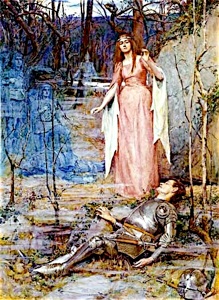La Belle Dame Sans Merci
Whene'er I take my PHYLLIS out
For moonlight walks, I like to stroll;
It gives me – I am rather stout –
More chance of laying bare my soul.
My tender pleading, I reflect,
Is robbed of all the charm that's in it
If my remarks are rudely checked
By gasps and puffing every minute.
Yet nothing less is now my fate;
Each night we wonder to and fro:
Our normal pace has been of late
A good six miles an hour or so.
Sadly the moments flit away:
No rays of joy my burdens lighten;
My PHYLLIS, I regret to say,
Is training for a walk to Brighton.
When I let fall a gentle hint
That I'm no devotee of pace,
She answers, "Now, suppose we sprint?
I must get fit before the race.
Unless I exercise my limbs
I feel my chances wane, diminish;
And I should die if that MISS SIMS
Arrived before me at the finish."
So off we go. No more her ears
May I enchant with honeyed phrase;
No more I win her smiles and tears,
As once I could – in happier days.
We don't fall out; we've have no tiff;
My passion glowswithout cessation;
But still, I'd love her better if
She'd choose some calmer recreation.
First published in Punch, August 19, 1903.
Note:
In the 150 years after its probable date of composition, Richard Roos' mid-fifteenth-century Belle Dame sans Mercy enjoyed a robust popularity. The poem, a translation of Alain Chartier's poem of the same name, appeared in a spate of manuscripts and early prints, and was frequently attributed to Chaucer until Thomas Tyrwhitt's 1775-78 edition of The Canterbury Tales excluded it from the Chaucer canon. In 1819, John Keats used the title (though not the plot) for a ballad, which in turn inspired a number of painters.



